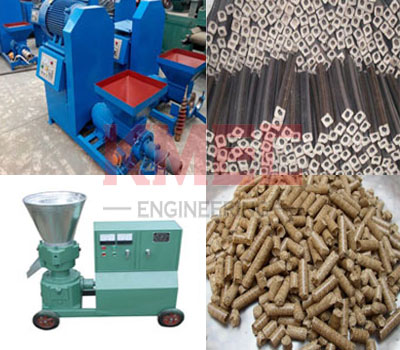Differences between briquettes and pellets
Biomass fuel has attracted more and more attention in recent years, especially biomass briquettes and pellets. Although they have many similarities in use, there are significant differences in production technology, shape, performance, application scenarios, etc. The following will analyze their differences from several aspects.

1. Production technology
The production processes for biomass briquettes and biomass pellets are similar: both involve compressing raw materials into a compact shape using high temperature and high pressure. However, the pellet production process is more refined. Briquettes typically compress coarse raw materials (such as sawdust and rice husks) into blocks, while pellet production involves first crushing the raw materials into finer particles, which are then extruded through a die into smaller cylinders. Pellet processing requires higher levels of technology and precision equipment.
2. Appearance and specifications
Biomass briquettes are generally large blocks or bricks, with varying sizes. They are typically used in industrial boilers or large-scale heating systems. Biomass pellets, on the other hand, are small, cylindrical, typically 6-10 mm in diameter and approximately 3-5 times their diameter in length. They are more uniform in appearance. This small, regular shape makes the pellets easier to store and transport.
3. Energy density and combustion performance
Due to their higher degree of compression, biomass pellets generally have a higher energy density than briquettes. Furthermore, pellet fuel has a lower moisture content, resulting in more complete combustion and higher thermal efficiency. While briquettes have slightly lower combustion efficiency, they are still suitable for industrial applications with high heat demands.
4. Applications
Biomass briquettes are often used in industrial applications, such as large boilers or power plants, as their larger size makes them more suitable for large-scale combustion. Biomass pellets, on the other hand, due to their compact size and high combustion efficiency, are more suitable for home heating, fireplaces, and small to medium-sized boilers. Pellets can also be used in specialized equipment, such as pellet stoves.
5. Cost and market
Due to the complexity of the production process, the production cost of biomass pellets is generally higher than that of briquettes. However, because pellet fuel is easier to transport, store, and use, it has a wider market demand, especially in the home and commercial sectors.
Both biomass briquettes and biomass pellets have their own advantages and disadvantages, and the choice depends on the specific application needs. For large-scale industrial use, briquettes may be more cost-effective; for home or small commercial use, pellets may be a more ideal choice. With the development of renewable energy technologies, both biomass fuels will play an increasingly important role in the future and contribute to the energy transition.

